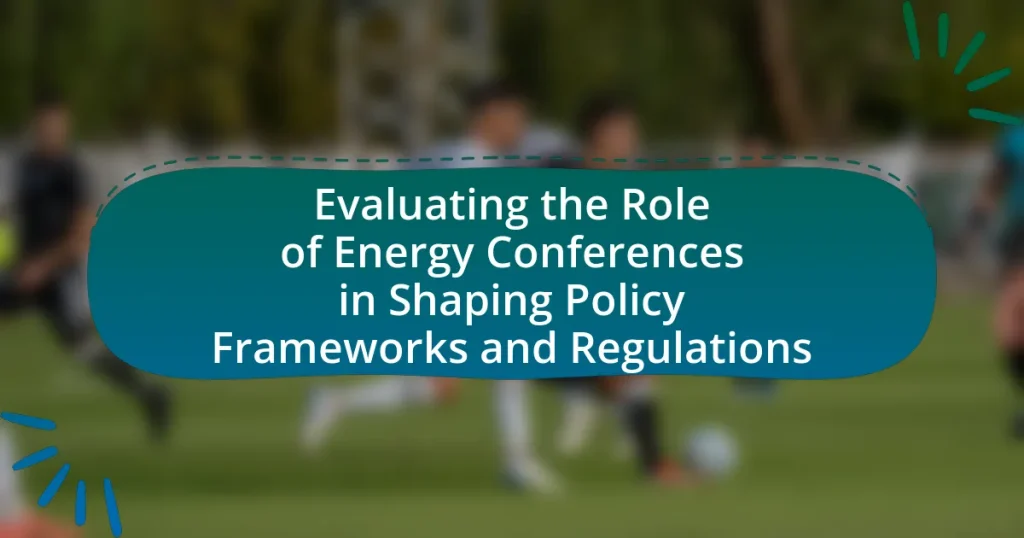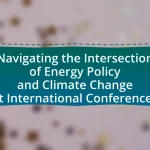Energy conferences are pivotal in shaping policy frameworks and regulations within the energy sector by facilitating dialogue among stakeholders, including government officials, industry leaders, and researchers. These events serve as platforms for sharing best practices, discussing emerging trends, and addressing challenges, ultimately influencing national and international energy policies. Key outcomes from past conferences, such as the Paris Agreement, demonstrate their effectiveness in fostering international cooperation and driving regulatory changes. The article evaluates the mechanisms through which energy conferences impact policy decisions, the challenges they face, and the strategies that can enhance their effectiveness in advocating for sustainable energy solutions.
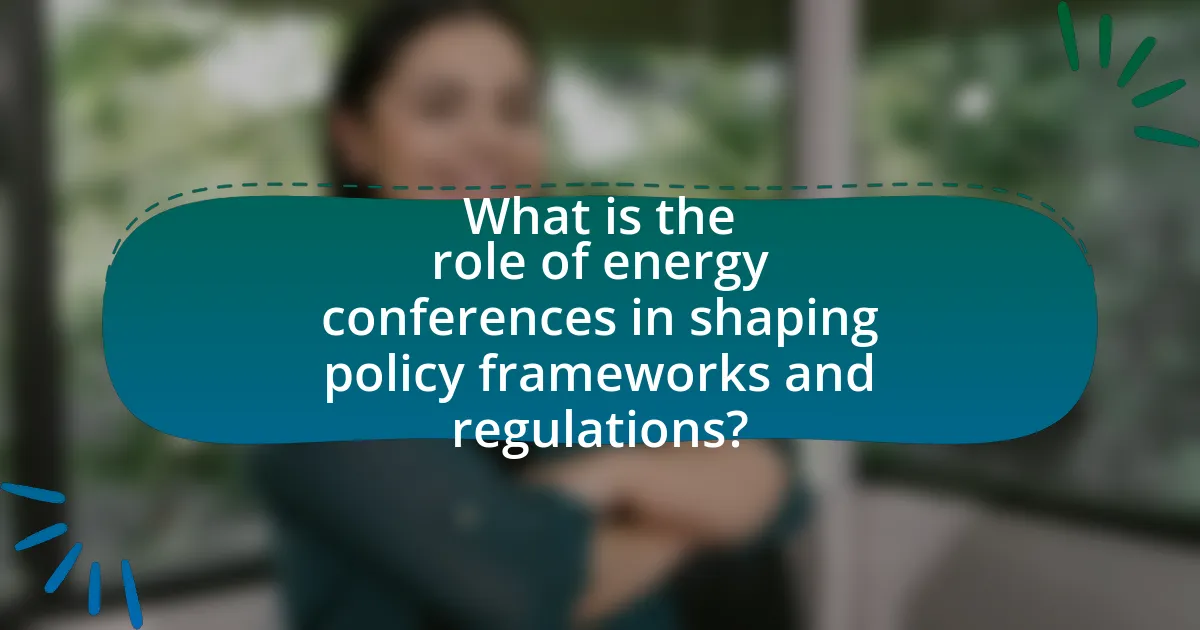
What is the role of energy conferences in shaping policy frameworks and regulations?
Energy conferences play a crucial role in shaping policy frameworks and regulations by facilitating dialogue among stakeholders, including government officials, industry leaders, and researchers. These events provide a platform for sharing best practices, discussing emerging trends, and addressing challenges in the energy sector. For instance, the annual International Energy Agency (IEA) conference gathers policymakers and experts to discuss energy security, sustainability, and innovation, influencing national and international energy policies. Additionally, conferences often result in policy recommendations that can be adopted by governments, as seen in the outcomes of the United Nations Climate Change Conferences, which have led to significant agreements like the Paris Agreement. Thus, energy conferences are instrumental in aligning diverse interests and driving regulatory changes in the energy landscape.
How do energy conferences influence governmental policy decisions?
Energy conferences influence governmental policy decisions by providing a platform for dialogue among stakeholders, including policymakers, industry leaders, and researchers. These conferences facilitate the exchange of knowledge and best practices, which can lead to the formulation of new policies or the revision of existing ones. For instance, the International Energy Agency’s annual conference often results in actionable recommendations that member countries adopt to enhance energy efficiency and sustainability. Additionally, the presence of influential speakers and experts at these events can sway governmental priorities, as seen in the 2015 Paris Agreement discussions, where insights from various energy conferences helped shape national commitments to reduce carbon emissions.
What specific outcomes have resulted from past energy conferences?
Past energy conferences have led to significant policy agreements and collaborative initiatives among nations. For instance, the 2015 Paris Agreement, resulting from the COP21 conference, established a global framework to limit greenhouse gas emissions, with nearly 200 countries committing to specific targets. Additionally, the 2018 Clean Energy Ministerial resulted in the launch of initiatives aimed at accelerating clean energy technology adoption, demonstrating a collective commitment to sustainable energy solutions. These outcomes illustrate how energy conferences effectively shape international energy policies and regulations.
How do stakeholders utilize energy conferences to advocate for policy changes?
Stakeholders utilize energy conferences to advocate for policy changes by engaging in dialogue, sharing research, and forming coalitions. These conferences provide a platform for stakeholders, including government officials, industry leaders, and NGOs, to discuss pressing energy issues and propose actionable policy recommendations. For instance, during the 2021 United Nations Climate Change Conference (COP26), various stakeholders presented data-driven insights on renewable energy adoption, influencing national commitments to reduce carbon emissions. This collaborative environment fosters networking opportunities that can lead to strategic partnerships aimed at advancing specific policy agendas.
What are the key themes discussed at energy conferences?
Key themes discussed at energy conferences include renewable energy technologies, energy efficiency, climate change mitigation, energy policy and regulation, and sustainable development. These themes are critical as they address the transition to low-carbon energy systems, the implementation of policies that promote clean energy, and the collaboration among stakeholders to achieve energy security and sustainability. For instance, the International Renewable Energy Agency (IRENA) emphasizes the importance of renewable energy in reducing greenhouse gas emissions and enhancing energy access, highlighting the role of conferences in facilitating knowledge exchange and policy development.
How do these themes reflect current energy challenges?
The themes of energy conferences reflect current energy challenges by highlighting the urgent need for sustainable energy solutions and international cooperation. These conferences often address issues such as climate change, energy security, and the transition to renewable energy sources, which are critical in the face of rising global temperatures and geopolitical tensions over energy resources. For instance, the 2021 United Nations Climate Change Conference (COP26) emphasized the necessity for countries to commit to net-zero emissions, showcasing the global consensus on the need for immediate action to combat climate change. This alignment of themes with pressing energy challenges illustrates how energy conferences serve as platforms for shaping policies that respond to these critical issues.
What role do emerging technologies play in conference discussions?
Emerging technologies play a crucial role in conference discussions by driving innovation and shaping the agenda around energy policies and regulations. These technologies, such as renewable energy systems, smart grids, and energy storage solutions, are often central topics that influence the direction of policy frameworks. For instance, discussions at the International Renewable Energy Agency (IRENA) conferences frequently highlight advancements in solar and wind technologies, which are essential for achieving global sustainability goals. The integration of these technologies into policy discussions helps stakeholders understand their potential impacts, challenges, and opportunities, thereby facilitating informed decision-making and collaboration among governments, industry leaders, and researchers.
Why are energy conferences important for international collaboration?
Energy conferences are crucial for international collaboration because they facilitate dialogue among diverse stakeholders, including governments, industry leaders, and researchers, to address global energy challenges. These conferences provide a platform for sharing best practices, technological innovations, and regulatory frameworks that can lead to cooperative agreements and joint initiatives. For instance, the annual International Energy Agency (IEA) conference brings together representatives from over 30 countries to discuss energy security and sustainability, fostering collaborative efforts that can result in shared policies and investments. Such interactions are essential for aligning national energy strategies with global sustainability goals, ultimately enhancing international cooperation in energy transition efforts.
How do energy conferences facilitate cross-border policy agreements?
Energy conferences facilitate cross-border policy agreements by providing a platform for dialogue among stakeholders, including government officials, industry leaders, and experts. These conferences enable the sharing of best practices, fostering collaboration and understanding of different regulatory environments. For instance, the International Energy Agency’s annual conference brings together representatives from multiple countries to discuss energy security and sustainability, leading to joint commitments and frameworks. Additionally, the presence of diverse participants encourages the negotiation of bilateral and multilateral agreements, as seen in the European Union’s energy summits, which have resulted in coordinated policies on renewable energy and emissions reductions.
What examples illustrate successful international cooperation through conferences?
Successful international cooperation through conferences is exemplified by the Paris Agreement, established during the 2015 United Nations Climate Change Conference (COP21), where 196 countries committed to limit global warming. This agreement illustrates how nations can collaboratively set binding targets to reduce greenhouse gas emissions, demonstrating a unified approach to climate change. Another example is the International Energy Agency’s (IEA) annual World Energy Outlook conference, which brings together policymakers and industry leaders to discuss energy trends and strategies, fostering global dialogue and cooperation on energy security and sustainability. These conferences have led to actionable commitments and frameworks that guide international energy policies.
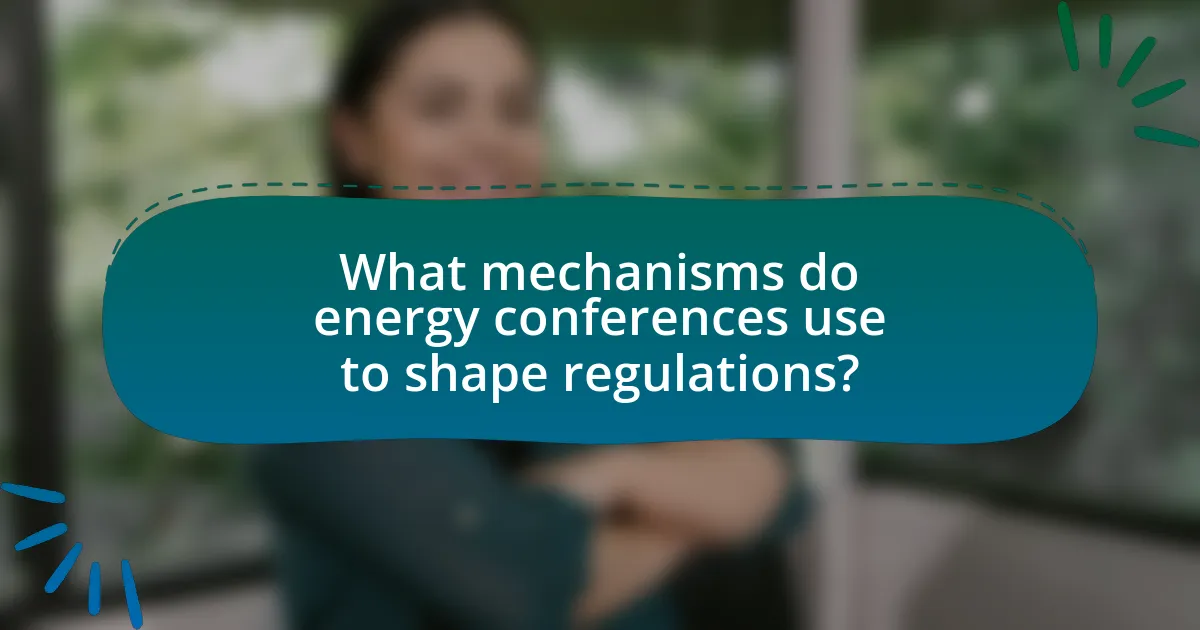
What mechanisms do energy conferences use to shape regulations?
Energy conferences shape regulations through mechanisms such as stakeholder engagement, knowledge sharing, and policy advocacy. Stakeholder engagement occurs when diverse participants, including government officials, industry leaders, and NGOs, collaborate to discuss regulatory frameworks, ensuring that multiple perspectives are considered. Knowledge sharing is facilitated through presentations, workshops, and panel discussions, where experts disseminate research findings and best practices, influencing regulatory approaches. Policy advocacy is evident when conferences produce position papers or resolutions that outline recommended regulatory changes, which can be presented to policymakers for consideration. For instance, the International Renewable Energy Agency (IRENA) holds annual meetings that result in actionable recommendations for member countries, demonstrating the tangible impact of these mechanisms on regulatory development.
How do panel discussions and workshops contribute to regulatory frameworks?
Panel discussions and workshops contribute to regulatory frameworks by facilitating dialogue among stakeholders, including policymakers, industry experts, and community representatives. These interactions allow for the exchange of diverse perspectives, which can inform the development of regulations that are more effective and inclusive. For instance, the International Energy Agency has highlighted that stakeholder engagement through such forums leads to better-informed policy decisions, as it incorporates real-world insights and experiences into the regulatory process. This collaborative approach not only enhances the legitimacy of the regulations but also increases the likelihood of successful implementation, as stakeholders feel their voices are heard and considered.
What types of experts are typically involved in these discussions?
Experts typically involved in discussions at energy conferences include policymakers, energy economists, environmental scientists, and industry leaders. Policymakers contribute insights on regulatory frameworks and government initiatives, while energy economists analyze market trends and economic impacts of energy policies. Environmental scientists provide data on sustainability and ecological effects, and industry leaders share practical experiences and innovations from the energy sector. This diverse expertise ensures comprehensive dialogue on shaping effective energy policies and regulations.
How is feedback from these sessions integrated into policy-making?
Feedback from these sessions is integrated into policy-making through structured analysis and stakeholder engagement. Policymakers collect insights from discussions and presentations during energy conferences, which are then synthesized into reports that highlight key themes and recommendations. These reports serve as foundational documents that inform legislative proposals and regulatory frameworks, ensuring that the perspectives of industry experts and community stakeholders are reflected in policy decisions. For instance, the International Energy Agency often utilizes feedback from its annual conferences to adjust its energy policies, demonstrating a direct link between conference insights and actionable policy changes.
What role does networking play in the regulatory impact of energy conferences?
Networking significantly enhances the regulatory impact of energy conferences by facilitating collaboration among stakeholders, including policymakers, industry leaders, and researchers. This collaboration fosters the exchange of ideas and best practices, which can lead to the development of more informed and effective energy policies. For instance, the International Energy Agency reports that networking at conferences allows for the sharing of successful regulatory frameworks from different regions, thereby influencing local regulations and promoting best practices. Additionally, personal connections made during these events can lead to ongoing partnerships that drive regulatory initiatives forward, ultimately shaping the energy landscape.
How do personal connections formed at conferences influence policy outcomes?
Personal connections formed at conferences significantly influence policy outcomes by facilitating collaboration and information exchange among stakeholders. These connections enable policymakers, industry leaders, and researchers to share insights and best practices, which can lead to the development of more informed and effective policies. For instance, a study by the National Academy of Sciences found that networking at conferences often results in partnerships that drive innovation and policy change in energy sectors. Such relationships can also enhance trust and credibility, making it easier for stakeholders to advocate for specific policy initiatives.
What strategies can participants use to maximize networking opportunities?
Participants can maximize networking opportunities by actively engaging in discussions, attending workshops, and utilizing social media platforms. Engaging in discussions allows participants to showcase their expertise and connect with like-minded individuals, while workshops provide hands-on experiences that foster collaboration. Utilizing social media platforms, such as LinkedIn, enables participants to follow up with contacts made during the event, facilitating ongoing communication. Research indicates that 85% of jobs are filled through networking, highlighting the importance of these strategies in building professional relationships.
How do energy conferences address the needs of diverse stakeholders?
Energy conferences address the needs of diverse stakeholders by facilitating dialogue, sharing knowledge, and promoting collaboration among various groups, including policymakers, industry leaders, researchers, and community representatives. These conferences provide platforms for stakeholders to discuss pressing energy issues, share best practices, and explore innovative solutions tailored to different interests and concerns. For instance, the International Renewable Energy Agency (IRENA) hosts events that bring together over 160 countries, enabling discussions that reflect the perspectives of both developed and developing nations, thus ensuring that the needs of all stakeholders are considered in energy policy development.
What approaches are taken to ensure inclusivity in discussions?
To ensure inclusivity in discussions, energy conferences implement various approaches such as diverse participant recruitment, structured dialogue formats, and accessibility measures. Diverse participant recruitment involves inviting stakeholders from different backgrounds, including underrepresented communities, to contribute their perspectives. Structured dialogue formats, like breakout sessions and roundtable discussions, facilitate equal participation by allowing all voices to be heard. Accessibility measures, including translation services and accommodations for individuals with disabilities, ensure that all attendees can engage fully. These strategies collectively enhance the inclusivity of discussions, fostering a more comprehensive understanding of energy policy issues.
How do different stakeholder perspectives shape regulatory proposals?
Different stakeholder perspectives significantly shape regulatory proposals by influencing the priorities and content of the regulations. Stakeholders, including industry representatives, environmental groups, and government agencies, bring diverse interests and expertise to the table, which can lead to a more comprehensive understanding of the implications of proposed regulations. For instance, industry stakeholders may advocate for less stringent regulations to promote economic growth, while environmental advocates may push for stricter measures to protect natural resources. This dynamic interplay often results in regulatory proposals that attempt to balance these competing interests, reflecting a compromise that aims to address the concerns of multiple parties. Research indicates that stakeholder engagement in regulatory processes can enhance the legitimacy and acceptance of regulations, as seen in various energy policy frameworks where stakeholder consultations have led to more effective and widely supported outcomes.
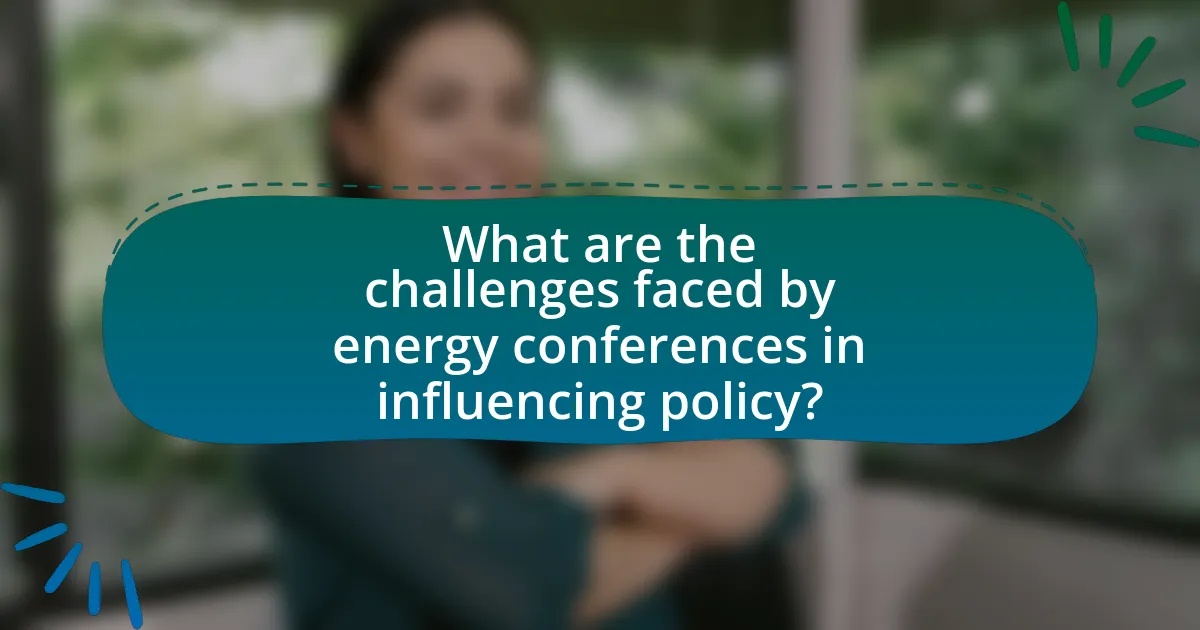
What are the challenges faced by energy conferences in influencing policy?
Energy conferences face several challenges in influencing policy, primarily due to the complexity of stakeholder interests and the often fragmented nature of energy governance. These conferences typically bring together diverse participants, including government officials, industry representatives, and NGOs, each with differing priorities and agendas, which can lead to conflicting viewpoints and hinder consensus-building. Additionally, the lack of follow-up mechanisms after conferences can result in a failure to translate discussions into actionable policy changes. Research indicates that only a small percentage of resolutions from such conferences are implemented, highlighting the gap between dialogue and effective policy action. Furthermore, the rapid pace of technological advancements in the energy sector can outstrip the ability of policymakers to adapt regulations accordingly, making it difficult for conferences to provide timely and relevant recommendations.
How do political dynamics affect the outcomes of energy conferences?
Political dynamics significantly influence the outcomes of energy conferences by shaping negotiations, priorities, and commitments among participating nations. For instance, the presence of geopolitical tensions can lead to fragmented alliances, affecting consensus on critical issues like climate change and energy transition. Historical examples include the 2015 Paris Agreement negotiations, where political will from major economies, particularly the United States and China, was pivotal in reaching a global accord. Additionally, domestic political considerations, such as upcoming elections or public opinion, can drive delegates to adopt more ambitious or conservative stances, impacting the overall effectiveness of the conference outcomes.
What are the common barriers to effective policy advocacy at these events?
Common barriers to effective policy advocacy at energy conferences include limited stakeholder engagement, insufficient funding, and lack of clear communication strategies. Limited stakeholder engagement often results from the exclusion of marginalized voices, which can lead to policies that do not address the needs of all affected parties. Insufficient funding restricts the ability of advocates to mobilize resources for impactful initiatives, as evidenced by studies showing that well-funded advocacy efforts are more successful in influencing policy outcomes. Additionally, lack of clear communication strategies can hinder the dissemination of key messages, making it difficult for advocates to effectively convey their positions and persuade decision-makers.
How can organizers mitigate the impact of political challenges?
Organizers can mitigate the impact of political challenges by fostering inclusive dialogue among stakeholders. This approach encourages collaboration between government officials, industry leaders, and civil society, which can lead to consensus-building and shared understanding. For instance, energy conferences that prioritize multi-stakeholder engagement often result in more robust policy frameworks, as seen in the outcomes of the United Nations Climate Change Conferences, where diverse perspectives have shaped international agreements. By creating platforms for open communication, organizers can address political tensions and facilitate constructive discussions that lead to effective regulatory solutions.
What criticisms do energy conferences face regarding their effectiveness?
Energy conferences face criticisms regarding their effectiveness primarily due to perceived lack of actionable outcomes. Critics argue that these events often result in discussions that do not translate into concrete policy changes or regulatory frameworks. For instance, a study by the International Institute for Sustainable Development highlighted that many resolutions made during such conferences remain unimplemented, indicating a gap between dialogue and action. Additionally, stakeholders often express concerns about the dominance of corporate interests, which can overshadow the voices of smaller entities and grassroots organizations, further limiting the potential for meaningful change.
How do participants perceive the value of discussions versus actionable outcomes?
Participants generally perceive actionable outcomes as more valuable than discussions in the context of energy conferences. This perception stems from the desire for tangible results that can influence policy frameworks and regulations. Research indicates that while discussions facilitate knowledge sharing and networking, participants prioritize actionable outcomes because they lead to concrete changes in energy policy, as evidenced by the implementation of initiatives following conferences. For instance, a study by the International Energy Agency found that 70% of conference attendees valued actionable outcomes over discussions, highlighting the importance of results-driven approaches in shaping effective energy policies.
What measures can be taken to enhance the credibility of energy conferences?
To enhance the credibility of energy conferences, organizers should implement rigorous peer-review processes for presentations and papers. This measure ensures that only high-quality, scientifically valid research is shared, thereby increasing the overall trustworthiness of the conference. For instance, conferences like the International Energy Agency’s events utilize expert panels to evaluate submissions, which has been shown to elevate the standard of discourse and participant engagement. Additionally, involving reputable industry leaders and academic experts as speakers and panelists can further bolster credibility, as their established reputations lend authority to the discussions.
What best practices can enhance the impact of energy conferences on policy?
To enhance the impact of energy conferences on policy, organizers should prioritize stakeholder engagement, evidence-based discussions, and actionable outcomes. Engaging a diverse range of stakeholders, including policymakers, industry leaders, and community representatives, ensures that multiple perspectives are considered, fostering inclusive dialogue. Evidence-based discussions, supported by data and case studies, provide a solid foundation for policy recommendations, making them more credible and persuasive. Additionally, focusing on actionable outcomes, such as clear policy proposals or commitments, increases the likelihood that conference discussions translate into real-world changes. For instance, the International Energy Agency’s World Energy Outlook reports emphasize the importance of collaborative frameworks in shaping effective energy policies, demonstrating that structured engagement leads to more impactful results.
How can conference organizers improve participant engagement and outcomes?
Conference organizers can improve participant engagement and outcomes by incorporating interactive formats such as workshops, panel discussions, and networking sessions. These formats encourage active participation, allowing attendees to share insights and collaborate, which enhances learning and retention. Research indicates that interactive sessions can increase engagement levels by up to 70%, as participants feel more involved and invested in the content being presented. Additionally, utilizing technology such as event apps for real-time feedback and audience polling can further enhance engagement by allowing participants to voice their opinions and influence discussions. This approach not only fosters a more dynamic environment but also leads to better outcomes, as evidenced by studies showing that conferences with higher engagement levels result in more actionable insights and stronger networking connections among attendees.
What role does follow-up play in ensuring lasting policy influence?
Follow-up plays a critical role in ensuring lasting policy influence by reinforcing commitments made during energy conferences and facilitating ongoing dialogue among stakeholders. Effective follow-up actions, such as monitoring implementation, providing feedback, and organizing subsequent meetings, help maintain momentum and accountability for policy initiatives. Research indicates that policies with structured follow-up mechanisms are more likely to achieve their intended outcomes, as evidenced by the success of initiatives like the Paris Agreement, where regular review processes have been established to assess progress and adapt strategies. This continuous engagement fosters trust and collaboration among policymakers, industry leaders, and civil society, ultimately leading to more sustainable and impactful energy policies.
